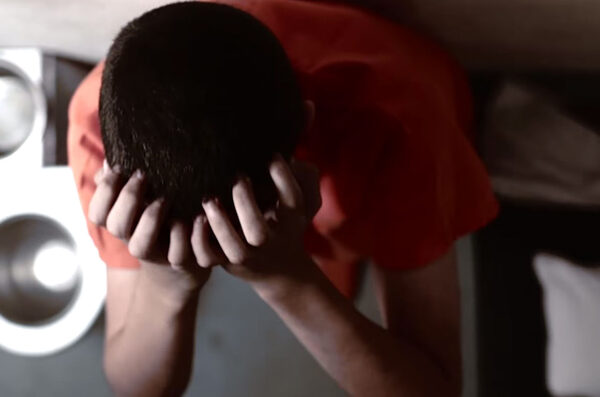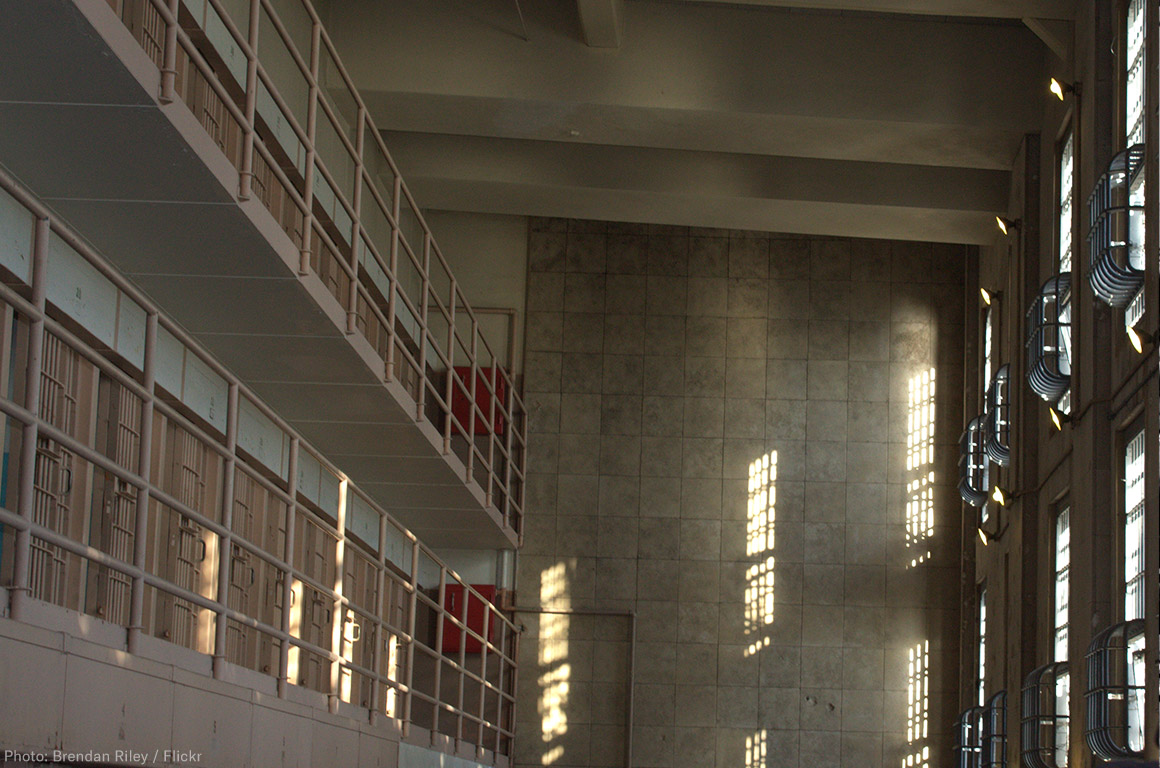Cruel, Inhuman, and Degrading Conditions
Jensen v. Thornell
UPDATE: In a thorough and sweeping injunction issued on April 7, 2023, U.S. District Judge Roslyn O. Silver is requiring the Arizona Department of Corrections, Rehabilitation, and Reentry (“ADCRR”) to make “substantial” changes to staffing and conditions so that medical care and mental healthcare at Arizona prisons comes up to constitutional standards.
Status: Closed (Judgment)
View Case
Learn About Cruel, Inhuman, and Degrading Conditions
Featured
Court Case
Sep 2022

Cruel, Inhuman, and Degrading Conditions
Alex A. v. Edwards
The ACLU National Prison Project and partner civil rights attorneys filed a federal class-action lawsuit to prevent the transfer of children in the custody of Louisiana's Office of Juvenile Justice to the Louisiana State Penitentiary, commonly known as Angola Prison.
Texas
Jul 2021

Cruel, Inhuman, and Degrading Conditions
Criminal Law Reform
Sanchez et al v. Dallas County Sheriff et al
Decarceration has always been an emergency, a life and death proposition, but COVID-19 makes this effort intensely urgent. The ACLU has been working with our partners to litigate for the rights of those who are incarcerated and cannot protect themselves because of the policies of the institutions in which they are jailed.
Mississippi
Mar 2017

Cruel, Inhuman, and Degrading Conditions
Prisoners' Rights
Dockery v. Hall
The ACLU, the Southern Poverty Law Center (SPLC), the Law Offices of Elizabeth Alexander, and the law firm of Covington & Burling LLP, filed a petition for class certification and expert reports for a federal lawsuit on behalf of prisoners at the East Mississippi Correctional Facility (EMCF). The lawsuit, which was filed in May 2013, describes the for-profit prison as hyper-violent, grotesquely filthy and dangerous. EMCF is operated "in a perpetual state of crisis" where prisoners are at "grave risk of death and loss of limbs." The facility, located in Meridian, Mississippi, is supposed to provide intensive treatment to the state's prisoners with serious psychiatric disabilities, many of whom are locked down in long-term solitary confinement.
All Cases
13 Cruel, Inhuman, and Degrading Conditions Cases

Nebraska
Aug 2017
Cruel, Inhuman, and Degrading Conditions
Sabata v. Nebraska Department of Corrections et al
Nebraska state prisons are in a state of chaos that is endangering the health, safety, and lives of prisoners and staff on a daily basis. For over twenty years, Nebraska prisons have been overcrowded, under-resourced, and understaffed. Prisoners are consistently deprived of adequate health care, including medical, dental, and mental health care, and denied accommodations for their disabilities. Nebraska state prisoners, including juveniles, suffer in harsh isolation units for excessive terms, sometimes lasting for years. These harms must end.
Explore case
Nebraska
Aug 2017

Cruel, Inhuman, and Degrading Conditions
Sabata v. Nebraska Department of Corrections et al
Nebraska state prisons are in a state of chaos that is endangering the health, safety, and lives of prisoners and staff on a daily basis. For over twenty years, Nebraska prisons have been overcrowded, under-resourced, and understaffed. Prisoners are consistently deprived of adequate health care, including medical, dental, and mental health care, and denied accommodations for their disabilities. Nebraska state prisoners, including juveniles, suffer in harsh isolation units for excessive terms, sometimes lasting for years. These harms must end.

Rhode Island
Jul 2017
Cruel, Inhuman, and Degrading Conditions
Prisoners' Rights
Inmates of the Rhode Island Training School for Youth v. Piccola
On July 24, U.S. District Court Chief Judge William Smith dismissed the ACLU’s lawsuit against the Rhode Island Training School for Youth, which challenged the deplorable conditions at the institution as violations of the Eighth Amendment. This landmark case is now closed at the behest of the ACLU and the state of Rhode Island because the institution has made the improvements in education, medical care, vocational training, the physical plant, meals, and other conditions required by the consent decree between the state and the plaintiffs.
Explore case
Rhode Island
Jul 2017

Cruel, Inhuman, and Degrading Conditions
Prisoners' Rights
Inmates of the Rhode Island Training School for Youth v. Piccola
On July 24, U.S. District Court Chief Judge William Smith dismissed the ACLU’s lawsuit against the Rhode Island Training School for Youth, which challenged the deplorable conditions at the institution as violations of the Eighth Amendment. This landmark case is now closed at the behest of the ACLU and the state of Rhode Island because the institution has made the improvements in education, medical care, vocational training, the physical plant, meals, and other conditions required by the consent decree between the state and the plaintiffs.

Court Case
Nov 2016
Cruel, Inhuman, and Degrading Conditions
National Security
ACLU v. Department of Justice, Bureau of Prisons
The American Civil Liberties Union filed suit against the federal Bureau of Prisons for refusing to fulfill a Freedom of Information Act request for documents related to its officials’ visit in 2002 to a CIA detention site in Afghanistan, their positive assessment of the conditions, and the training they provided to the site’s administrators. Code-named COBALT and also called “the Salt Pit,” the site held people suspected of terrorism, and they were tortured there, according to the U.S. Senate Intelligence Committee’s torture report that was declassified in 2014.
Explore case
Court Case
Nov 2016

Cruel, Inhuman, and Degrading Conditions
National Security
ACLU v. Department of Justice, Bureau of Prisons
The American Civil Liberties Union filed suit against the federal Bureau of Prisons for refusing to fulfill a Freedom of Information Act request for documents related to its officials’ visit in 2002 to a CIA detention site in Afghanistan, their positive assessment of the conditions, and the training they provided to the site’s administrators. Code-named COBALT and also called “the Salt Pit,” the site held people suspected of terrorism, and they were tortured there, according to the U.S. Senate Intelligence Committee’s torture report that was declassified in 2014.

Arizona
Apr 2016
Cruel, Inhuman, and Degrading Conditions
Graves v. Penzone
Despite a federal court order from 2008, the Maricopa County jails – overseen by Sheriff Joe Arpaio –continue to skirt their constitutional responsibility for detainees' mental health. On April 1, 2016, the American Civil Liberties Union and the ACLU of Arizona – which have represented the detainees at the Maricopa County jails for close to 20 years – filed a motion to enforce the 2008 order. Many detainees with mental illnesses were still suffering unnecessarily from the scarcity and poor quality of the jails' care.
Explore case
Arizona
Apr 2016

Cruel, Inhuman, and Degrading Conditions
Graves v. Penzone
Despite a federal court order from 2008, the Maricopa County jails – overseen by Sheriff Joe Arpaio –continue to skirt their constitutional responsibility for detainees' mental health. On April 1, 2016, the American Civil Liberties Union and the ACLU of Arizona – which have represented the detainees at the Maricopa County jails for close to 20 years – filed a motion to enforce the 2008 order. Many detainees with mental illnesses were still suffering unnecessarily from the scarcity and poor quality of the jails' care.

Court Case
Jun 2015
Cruel, Inhuman, and Degrading Conditions
C.B. et al. v. Walnut Grove Correctional Authority, et. al.
In June 2015, a federal court decided in favor of the ACLU position in Walnut Grove. With this federal court ruling, the Mississippi Department of Corrections will be held accountable to their Constitutional mandate to protect the prisoners of Walnut Grove from violence. A victory for prisoner's rights, this decision marks a major blow to the for-profit industrial complex.
In April 2015, in federal court, the ACLU National Prison Project, the Southern Poverty Law Center, and McDuff & Byrd are all participating in a hearing that seeks to prove that the Mississippi Department of Corrections is violating the Eighth Amendment rights of all prisoners at Walnut Grove Correctional Facility to protection from violence. The department contracts with a for-profit prison operator, Management and Training Corporation (MTC), to run Walnut Grove. Over the years it has been proven that MTC has failed to implement fundamental security measures to ensure prisoner safety, which resulted in two major riots in 2014 that left 25 prisoners seriously injured. Three years ago, the Mississippi Department of Corrections agreed to take specific measures to reduce the violence at Walnut Grove when it settled a federal lawsuit brought by the ACLU National Prison Project and the Southern Poverty Law Center.
The 2012 case decided that children under the supervision of the Mississippi Department of Corrections (MDOC) would no longer be housed in a privately run prison or subjected to brutal solitary confinement. The lawsuit charged that conditions at the Walnut Grove Youth Correctional Facility, operated by GEO Group, Inc., were unconstitutional.
Explore case
Court Case
Jun 2015

Cruel, Inhuman, and Degrading Conditions
C.B. et al. v. Walnut Grove Correctional Authority, et. al.
In June 2015, a federal court decided in favor of the ACLU position in Walnut Grove. With this federal court ruling, the Mississippi Department of Corrections will be held accountable to their Constitutional mandate to protect the prisoners of Walnut Grove from violence. A victory for prisoner's rights, this decision marks a major blow to the for-profit industrial complex.
In April 2015, in federal court, the ACLU National Prison Project, the Southern Poverty Law Center, and McDuff & Byrd are all participating in a hearing that seeks to prove that the Mississippi Department of Corrections is violating the Eighth Amendment rights of all prisoners at Walnut Grove Correctional Facility to protection from violence. The department contracts with a for-profit prison operator, Management and Training Corporation (MTC), to run Walnut Grove. Over the years it has been proven that MTC has failed to implement fundamental security measures to ensure prisoner safety, which resulted in two major riots in 2014 that left 25 prisoners seriously injured. Three years ago, the Mississippi Department of Corrections agreed to take specific measures to reduce the violence at Walnut Grove when it settled a federal lawsuit brought by the ACLU National Prison Project and the Southern Poverty Law Center.
The 2012 case decided that children under the supervision of the Mississippi Department of Corrections (MDOC) would no longer be housed in a privately run prison or subjected to brutal solitary confinement. The lawsuit charged that conditions at the Walnut Grove Youth Correctional Facility, operated by GEO Group, Inc., were unconstitutional.
